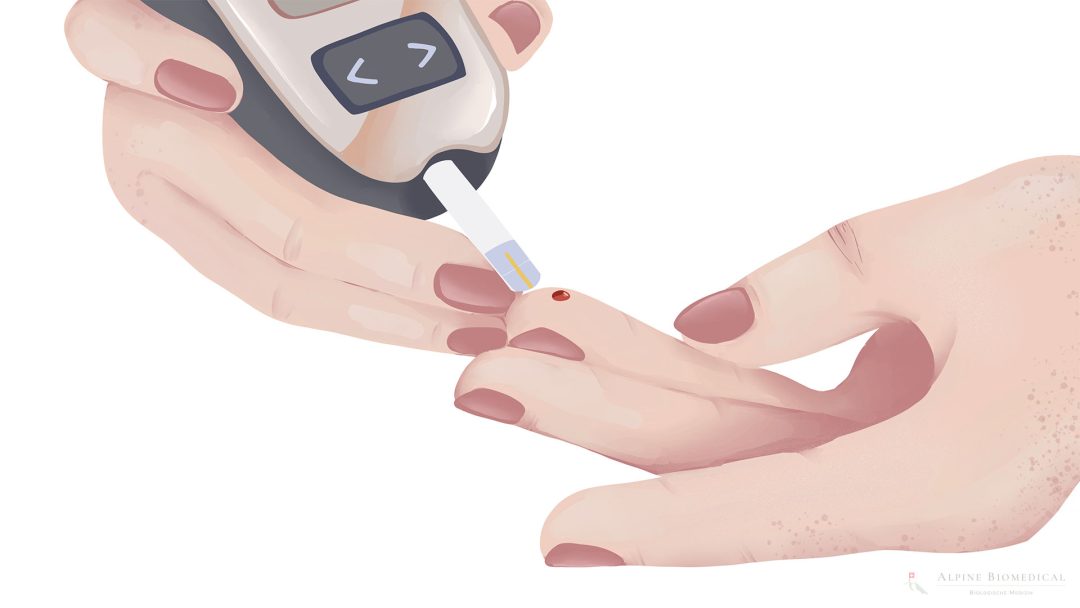Diabetes

Diabetes mellitus is a chronic metabolic disease characterized by an elevated blood sugar level. At the heart of the disease is the hormone insulin, which has the ability to transport glucose from the blood into the body’s cells, where it can then be used to produce energy. Depending on which form of diabetes is involved, there is either a lack of insulin (type 1 diabetes) or a loss of insulin action on the cells (insulin resistance in type 2 diabetes).
Type 1 Diabetes
Type 1 diabetes is sometimes also referred to as insulin-dependent diabetes or juvenile diabetes. It is an autoimmune disease in which the beta cells of the pancreas are destroyed and insulin is no longer produced as a result. This clinical picture occurs more frequently in children and adolescents.
Patients are dependent on an additional, external supply of insulin.
The causes of type 1 diabetes include genetic predispositions, environmental factors and infectious diseases. For example, infections with various viral diseases (for example EBV or CMV) can trigger the development of type 1 diabetes.
Type 2 Diabetes
Type 2 diabetes is sometimes also referred to as adult-onset diabetes because it occurs more frequently in old age. In type 2 diabetes, the pancreas can continue to produce insulin. However, the amount produced is often insufficient and/or the cells have developed a resistance to the insulin, which means that the insulin cannot exert its effect. As a result, the sugar (glucose) remains in the blood and does not reach the cells sufficiently.
Risk factors for the development of type 2 diabetes are genetic predisposition, obesity, an unhealthy diet and a lack of physical activity. However, an unhealthy intestinal flora can also be involved in the development of type 2 diabetes.
Dental diseases such as periodontitis, hidden inflammation in the jaw and teeth can also promote the development of type 2 diabetes.
Symptoms of Diabetes
The symptoms of diabetes can be varied. They include increased thirst, frequent urination, tiredness, weight loss and blurred vision. With type 2 diabetes, the symptoms often develop gradually, which is why the disease is not recognized immediately. An increased susceptibility to infections due to a weakened immune system can also be a symptom of diabetes.
Consequences of Diabetes
Glucose is used in the body as a source of energy and must be channeled into the body’s cells to produce energy. If insulin is missing or the cells have developed insulin resistance, less glucose enters the cells and more glucose remains in the bloodstream. This has a variety of health consequences.
The secondary diseases of diabetes include:
- Damage to the blood vessels due to the high concentration of glucose. Arteriosclerosis, stroke or heart attack can develop
- Vascular damage to the kidneys (diabetic nephropathy)
- Vascular damage in the eye with reduced vision (diabetic retinopathy)
- Circulatory disorders of the extremities
- Impotence or erectile dysfunction
- Poorly healing chronic wounds, for example diabetic foot
- Sensory disorders and nerve pain due to poor blood flow to the nerves (diabetic polyneuropathy)
- Fatigue and permanent exhaustion
People with diabetes must regularly monitor their blood sugar levels to prevent damage to their organs as far as possible.
Treatment of Diabetes
The treatment of diabetes is primarily aimed at controlling blood sugar levels and preventing complications of high or low blood sugar levels. Furthermore, the body should be strengthened and relieved.
Measures include:
- Lifestyle changes: A healthy diet, regular physical activity and weight control are crucial, especially for type 2 diabetes. Lifestyle changes can help improve insulin sensitivity.
- Drug therapy: In some cases, medication is necessary to regulate blood sugar levels. These include oral antidiabetics, e.g. metformin, or insulin injections.
- Intestinal cleanse with normalization of the diseased intestinal flora
- Detoxifying measures
- Compensation of micronutrient deficiencies through dietary supplements and infusion therapy
- Effective relief and optimization of the immune system
- Mitochondrial therapy
- Minimization of oxidative stress
- Treatment of silent inflammation, for example jaw inflammation or periodontitis.
Dr. med. Karsten Ostermann M.A.
An integrative and interdisciplinary approach has proven very successful for diabetes. Causative factors should be sufficiently taken into account during therapy.

Further information
The information listed contains relevant topics and serves to improve understanding.